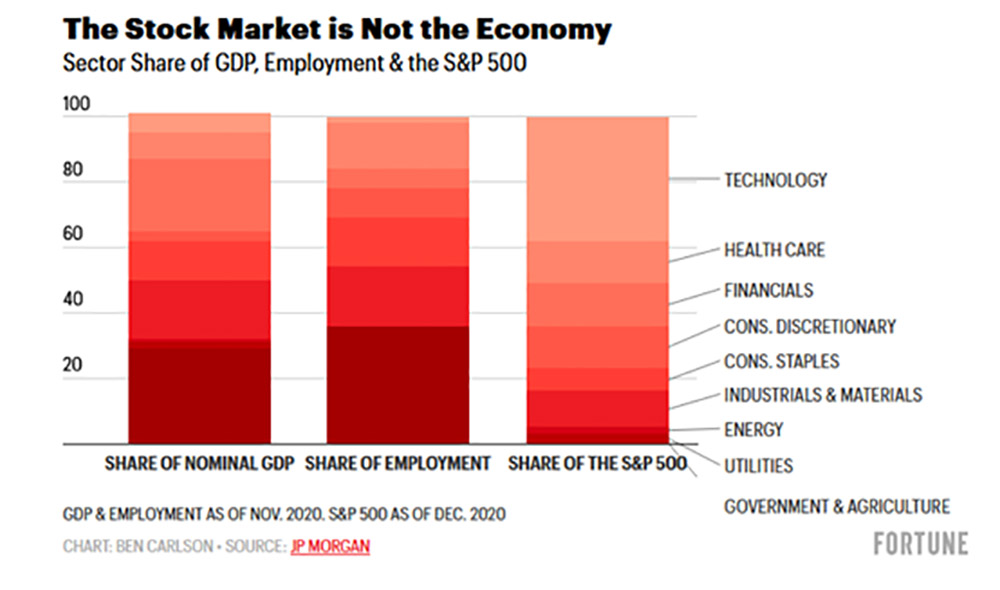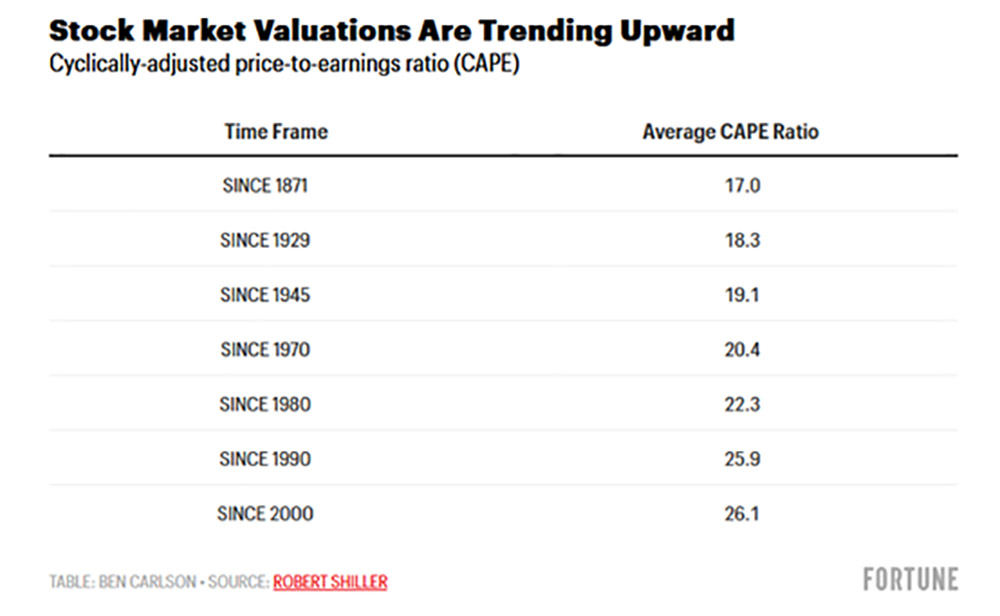2011年,風險投資家馬克·安德森寫了一篇本世紀最有先見之明的文章《為什么軟件正在吞噬世界》(Why Software Is Eating the World)。他列舉了一系列理由,證明科技正在從根本上改變我們的經營方式,這可能會帶來好的影響:
我的理論是,我們正處在劇烈而廣泛的技術和經濟變革之中,軟件公司將主宰大部分經濟領域。
從電影到農業再到國防,越來越多的大企業和行業都依賴于軟件運行,并將其作為一種在線服務向客戶提供。許多成功者都是硅谷風格的科技公司,它們侵入并顛覆了已經建立起來的行業架構。未來十年,我預計會有更多行業被軟件瓦解,行業破壞者將更多來自新近涌現的世界級的硅谷公司。
安德森列舉了許多理由來佐證他的理論:
? 技術可以在全球范圍鋪展開來。
? 數以十億計的人們使用互聯網并擁有智能手機。
? 這些工具使創業變得更容易,避免了巨額的前期投入。
安德森確實一語中的,但軟件同時也在吞噬股票市場,而且這種趨勢已經持續了多年。
過去,大部分企業的資產負債表中全都是土地、建筑物、設備和庫存等有形資產。但現在,大部分資產變成了無形資產,比如專利、品牌價值、軟件和客戶數據等。

看看從1985年到1995年互聯網飛速發展時期所發生的變化。現在的公司資產負債表與20世紀70年代已經截然不同。
1980年,標準普爾500指數(S&P 500)市值最高的10只股票中,有7只是能源企業。只有一家科技公司(IBM)。20世紀80年代初,能源行業在標準普爾500指數中的占比接近30%。如今,能源行業在該指數中的比重已經縮小到約2.5%。
科技股取代了能源股,一躍成為最大的行業,所占比重達到24%。而且這個比重可能被低估。例如,標準普爾500指數中市值最大的六家公司分別是蘋果(Apple)、微軟(Microsoft)、亞馬遜(Amazon)、谷歌(Google)、特斯拉(Tesla)和Facebook,在大多數人看來它們都是科技股或至少與科技股相關。
這六家公司的市值接近8萬億美元。
但在這六家公司中,只有蘋果和微軟在技術層面上屬于科技行業。Facebook和谷歌屬于通信服務業。亞馬遜和特斯拉屬于非必需消費品行業。
爭論這些公司屬于哪個行業,或許像是在玩文字游戲,但關鍵在于,科技行業在股票市場中的地位已經根深蒂固,比以前的比重更大。
通過對比科技行業和總體經濟,能夠更清晰地理解科技行業如何主宰股票市場:

摩根大通(JPMorgan)估計,科技股在股票市場中的實際比重接近40%,但這些公司占美國名義GDP的6%,僅提供了2%的就業崗位。
例如,在20世紀初,美國鋼鐵公司(U.S. Steel)成為第一家市值達到10億美元的公司。1902年,該公司的員工接近17萬。Instagram在2012年被Facebook以10億美元的價格收購。但當時這家公司只有13名員工。
科技還影響了股票市場的估值。隨著科技股的比重日益擴大,股票市場的平均長期估值一直在緩慢提高:

估值上漲還有其他原因,比如利率下調、來自美聯儲(Federal Reserve)的影響、更低投資成本和更專業的投資者等。
但科技股和無形資產的增長也產生了影響,因為增長速度更快、資本密集性更低的公司往往可以獲得更高估值。
這對未來的投資者意味著什么呢?
隨著無形資產的增長,公司收益與股價的關聯性與過去相比變得越來越低。尤其是中短期內,預期的重要性變得與實際基本面相當,甚至有過之而無不及。
對于每一位成功的投資者來說,其工作重點都是分析基本面與預期之間的潛在定價偏差。當市場中有更多科技公司時,預期很容易與基本面脫鉤,這種情況好壞參半。
這意味著對可能改變世界抑或是最終走向崩潰的公司來說,隨著投資者不斷調整對這些公司的預期,他們會看到更多的漲跌。
市場將出現更快頻率的波動。科技創新會給全世界帶來巨變,但令投資者興奮的新公司,同樣也需要投資者承擔更多的風險。
股票市場中的科技股占比更高并不能夠保證投資者可以獲得更高的回報,但可能意味著市場循環速度加快。去年,標準普爾500指數以史上最快的速度跌入熊市,跌幅超過30%,但其隨后以史上第二快的速度從下跌30%的熊市實現反彈。
隨著市場數據、計算能力和信息的日益普及,預計未來市場波動的頻率會變得更快。(財富中文網)
本文作者本·卡爾森現任里薩茲財富管理公司(Ritholtz Wealth Management)機構資產管理總監。作者可能持有本文中所提到的證券或資產。
翻譯:劉進龍
審校:汪皓
2011年,風險投資家馬克·安德森寫了一篇本世紀最有先見之明的文章《為什么軟件正在吞噬世界》(Why Software Is Eating the World)。他列舉了一系列理由,證明科技正在從根本上改變我們的經營方式,這可能會帶來好的影響:
我的理論是,我們正處在劇烈而廣泛的技術和經濟變革之中,軟件公司將主宰大部分經濟領域。
從電影到農業再到國防,越來越多的大企業和行業都依賴于軟件運行,并將其作為一種在線服務向客戶提供。許多成功者都是硅谷風格的科技公司,它們侵入并顛覆了已經建立起來的行業架構。未來十年,我預計會有更多行業被軟件瓦解,行業破壞者將更多來自新近涌現的世界級的硅谷公司。
安德森列舉了許多理由來佐證他的理論:
? 技術可以在全球范圍鋪展開來。
? 數以十億計的人們使用互聯網并擁有智能手機。
? 這些工具使創業變得更容易,避免了巨額的前期投入。
安德森確實一語中的,但軟件同時也在吞噬股票市場,而且這種趨勢已經持續了多年。
過去,大部分企業的資產負債表中全都是土地、建筑物、設備和庫存等有形資產。但現在,大部分資產變成了無形資產,比如專利、品牌價值、軟件和客戶數據等。
標準普爾500指數里的有形資產和無形資產占比情況
資料來源:VISUAL CAPITALIST
看看從1985年到1995年互聯網飛速發展時期所發生的變化。現在的公司資產負債表與20世紀70年代已經截然不同。
1980年,標準普爾500指數(S&P 500)市值最高的10只股票中,有7只是能源企業。只有一家科技公司(IBM)。20世紀80年代初,能源行業在標準普爾500指數中的占比接近30%。如今,能源行業在該指數中的比重已經縮小到約2.5%。
科技股取代了能源股,一躍成為最大的行業,所占比重達到24%。而且這個比重可能被低估。例如,標準普爾500指數中市值最大的六家公司分別是蘋果(Apple)、微軟(Microsoft)、亞馬遜(Amazon)、谷歌(Google)、特斯拉(Tesla)和Facebook,在大多數人看來它們都是科技股或至少與科技股相關。
這六家公司的市值接近8萬億美元。
但在這六家公司中,只有蘋果和微軟在技術層面上屬于科技行業。Facebook和谷歌屬于通信服務業。亞馬遜和特斯拉屬于非必需消費品行業。
爭論這些公司屬于哪個行業,或許像是在玩文字游戲,但關鍵在于,科技行業在股票市場中的地位已經根深蒂固,比以前的比重更大。
通過對比科技行業和總體經濟,能夠更清晰地理解科技行業如何主宰股票市場:
股票市場不是經濟。資料來源:JP MORGAN
摩根大通(JPMorgan)估計,科技股在股票市場中的實際比重接近40%,但這些公司占美國名義GDP的6%,僅提供了2%的就業崗位。
例如,在20世紀初,美國鋼鐵公司(U.S. Steel)成為第一家市值達到10億美元的公司。1902年,該公司的員工接近17萬。Instagram在2012年被Facebook以10億美元的價格收購。但當時這家公司只有13名員工。
科技還影響了股票市場的估值。隨著科技股的比重日益擴大,股票市場的平均長期估值一直在緩慢提高:
股市估值一直在緩慢提高。資料來源:ROBERT SHILLER
估值上漲還有其他原因,比如利率下調、來自美聯儲(Federal Reserve)的影響、更低投資成本和更專業的投資者等。
但科技股和無形資產的增長也產生了影響,因為增長速度更快、資本密集性更低的公司往往可以獲得更高估值。
這對未來的投資者意味著什么呢?
隨著無形資產的增長,公司收益與股價的關聯性與過去相比變得越來越低。尤其是中短期內,預期的重要性變得與實際基本面相當,甚至有過之而無不及。
對于每一位成功的投資者來說,其工作重點都是分析基本面與預期之間的潛在定價偏差。當市場中有更多科技公司時,預期很容易與基本面脫鉤,這種情況好壞參半。
這意味著對可能改變世界抑或是最終走向崩潰的公司來說,隨著投資者不斷調整對這些公司的預期,他們會看到更多的漲跌。
市場將出現更快頻率的波動。科技創新會給全世界帶來巨變,但令投資者興奮的新公司,同樣也需要投資者承擔更多的風險。
股票市場中的科技股占比更高并不能夠保證投資者可以獲得更高的回報,但可能意味著市場循環速度加快。去年,標準普爾500指數以史上最快的速度跌入熊市,跌幅超過30%,但其隨后以史上第二快的速度從下跌30%的熊市實現反彈。
隨著市場數據、計算能力和信息的日益普及,預計未來市場波動的頻率會變得更快。(財富中文網)
本文作者本·卡爾森現任里薩茲財富管理公司(Ritholtz Wealth Management)機構資產管理總監。作者可能持有本文中所提到的證券或資產。
翻譯:劉進龍
審校:汪皓
In 2011, venture capitalist Marc Andreessen wrote one of the more prescient pieces of this century, called Why Software Is Eating the World. He laid out his reasoning behind the idea that technology is fundamentally changing the way we do business, likely for good:
My own theory is that we are in the middle of a dramatic and broad technological and economic shift in which software companies are poised to take over large swathes of the economy.
More and more major businesses and industries are being run on software and delivered as online services—from movies to agriculture to national defense. Many of the winners are Silicon Valley–style entrepreneurial technology companies that are invading and overturning established industry structures. Over the next 10 years, I expect many more industries to be disrupted by software, with new world-beating Silicon Valley companies doing the disruption in more cases than not.
Andreessen listed a number of reasons for his theory:
? Technology can be delivered around the globe at scale.
? Billions of people use the Internet and own smartphones.
? These tools make it easier than ever to launch new businesses without huge upfront costs.
Andreessen was right, of course, but software has been eating the stock market also, and this trend has been in place for many years.
In the past, most corporations had balance sheets full of tangible assets, including things like land, buildings, equipment, and inventory. Now the majority of assets are intangible, things like patents, brand value, software, and customer data.
Look at that shift from 1985 to 1995 as the Internet came online in a meaningful way. The corporate balance sheet of today looks nothing like the one from the 1970s.
In 1980, seven of the 10 biggest stocks in the S&P 500 were energy corporations. Just one was a technology firm (IBM). The energy sector made up nearly 30% of the S&P 500 in the early 1980s. It's now down to roughly 2.5% of the index.
Technology has taken energy's place at the top of the heap as the largest sector, with a 24% weight. And that weighting is likely understated. For instance, the six biggest companies in the S&P 500 are all what most people would consider tech stocks or at least tech-adjacent companies—Apple, Microsoft, Amazon, Google, Tesla, and Facebook.
Collectively, these six stocks are worth around $8 trillion.
Yet Apple and Microsoft are the only two companies of the six that are technically listed in the technology sector. Facebook and Google are in the communication services sector. Amazon and Tesla are considered consumer discretionary stocks.
It may be semantics to debate which sector these companies belong in, but the point is technology is now firmly entrenched across the stock market in a bigger way than ever before.
You can get a better sense of how the tech sector has swallowed the stock market by comparing it to the overall economy:
JPMorgan estimates the true weighting in the market for tech stocks is closer to 40%—while those companies account for 6% of nominal GDP and employ just 2% of the country's workers.
Consider the fact that U.S. Steel was the first billion-dollar corporation in the early 1900s. In 1902, the company employed nearly 170,000 people. Instagram was sold for $1 billion to Facebook in 2012. At the time the company had just 13 employees.
Technology has also had an impact on stock market valuations. Average long-term valuations have slowly moved upward over time as tech has become a bigger piece of the pie:
There are other reasons valuations have been trending higher over time—falling interest rates, the role of the Federal Reserve, lower costs to invest, and more professionalized investors, to name a handful.
But the growth in technology stocks and intangible assets has played a role here as higher growth, less-capital-intensive businesses tend to have higher valuations.
So what does this mean for investors going forward?
Because of the rise of intangible assets, earnings are far less relevant today than they were in the past. And expectations matter just as much or more than the actual fundamental numbers, especially in the short to intermediate term.
Every successful investor's job is to figure out where there are potential mispricings between fundamentals and expectations. When the market is filled with more technology companies, it becomes much easier for expectations to detach from fundamentals, in both good and bad ways.
This means investors should expect to see more booms and busts as people try to right-size their expectations for companies that could either change the world or crash and burn.
Markets will move faster. Technological innovation can create massive change in the world, but new and exciting companies also invite more risk-taking from investors.
More tech stocks in the market don't guarantee higher returns for investors, but it likely means market cycles will speed up. Just last year the S&P 500 experienced the fastest bear market of 30% or worse—as well as the second-fastest full recovery from a 30% bear market.
With increased access to market data, computational power, and information, expect market moves to happen faster in the future.
Ben Carlson is the director of institutional asset management at Ritholtz Wealth Management. He may own securities or assets discussed in this piece.






